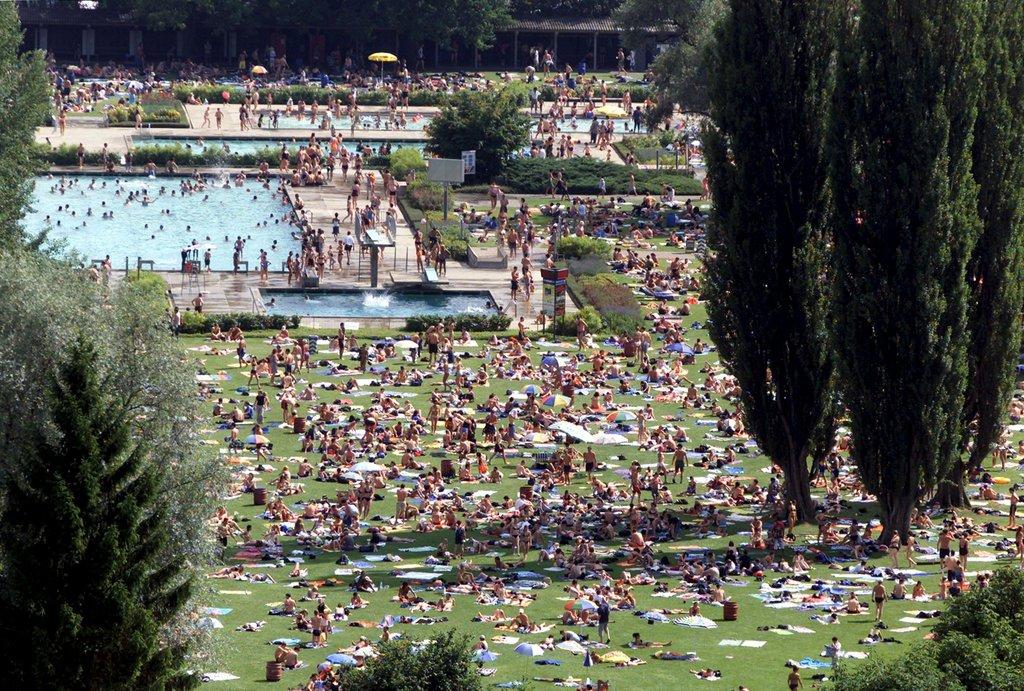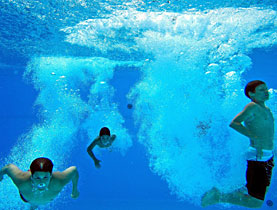
Open-air public pools face chilling dilemma

When the sun’s out in summer, Switzerland’s open-air swimming pools are overflowing. But the majority face a harsh reality: spend a fortune on cleaning or close permanently.
Most of the country’s 500 beaches or open-air pools were built in the 1970s and 1980s, when making a profit wasn’t considered as important as being a public service. Although they have been well maintained over the years, the national pool association says it is frequently asked by pool owners for advice.
“Many come to us wanting to know their options: clean, renovate or close?” said the association’s director Stefan Schlatter.
Running a swimming pool is hard work. According to the Federal Office of Sport, a 50-metre open-air pool costs on average around CHF570,000 ($569,000) a year. Several municipalities spend hundreds of thousands of francs to cover the deficits – the income from entry fees is nowhere near enough.

More
Urine-filled pools to be cleaned up
Schlatter says an entry fee of CHF10 to CHF12 for an adult is certainly reasonable, but some pools charge only CHF5 – far too little to break even. In Bern, the popular MarziliExternal link pool and bathing area is even free. The most expensive public pool in Switzerland is the new one in St MoritzExternal link, which will set an adult back CHF15.
Greater demands
Open-air pools are no longer a place for physical education and exercise.
“Visitors are more demanding nowadays,” Schlatter says. “They’re looking for an unusual experience, relaxation and pleasure. A 25-metre pool in which you do lengths no longer cuts it.”
A modern pool is heated and has slides or a sauna. A new installation on the shore of Lake Ägeri in central Switzerland, set to open in September at a cost of CHF36 million, will offer a heated pool all year round. Some 150,000 swimmers are expected a year.
In addition, technical and hygiene demands have also increased and are adding to budgets. When it comes to water quality, the oldest pools have reached their limit, since their sand filters are no longer able to circulate the water six times a day as the law requires.
Higher taxes
Despite the financial challenges, most owners opt for renovations, spreading the costs over several years, says Christian Barascud, president of the swimming pool association for French- and Italian-speaking Switzerland.
In Prilly, the ageing Fleur-de-Lys pool, which had technical problems, was completely renovated between 2014 and 2015, with the municipality making available almost CHF15 million.
In Näfels, there is a discussion on whether to close the pool. The same debate is being held in Zuchwil and Grosshöchstetten – although in those two cases locals prefer the cleaning option, even if it means higher taxes.

In compliance with the JTI standards
More: SWI swissinfo.ch certified by the Journalism Trust Initiative





























You can find an overview of ongoing debates with our journalists here . Please join us!
If you want to start a conversation about a topic raised in this article or want to report factual errors, email us at english@swissinfo.ch.